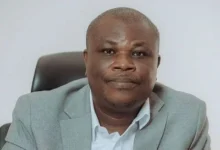
The Minister of Sanitation and Water Resources (MSWR), Ms Cecilia Abena Dapaah, yesterday stopped the activities of encroachers around the buffer zone of the Weija Dam in the Weija-Gbawe Municipal Assembly in the Greater Accra Region.
She also asked military men stationed at the military check point on the route to the dam to stop and return every truck filled with sand leaving the Weija dam site.
The Minister gave these directives during a recognisance tour to the Weija treatment plant to access the level of impact of human activities, such as sand winning and encroachment to the plant.
At the bank of the dam, an excavator was seen digging and filling trucks with sand on the site.
The minister also ordered three trucks which were already loaded with sand to return and offload them, adding “these activities affect the dam and the production of water for consumption.”
She ordered that the key to the excavator be seized and asked the driver to inform his boss to come over to the ministry.
Also, it came to the knowledge of the minister and her team that, an amount of between ₵180 and ₵200 was charged every truck that loaded stones or sand at the buffer zone
Ms Dapaah said theWeija dam was the source of raw water to the treatment plant thattookcare of 1.5 million people in Accra,adding that “so if the integrity of the system is touched then it means we are playing with the lives of 1.5 million people.”
“We looking for funding to rehabilitateand expand so that we can take care of the population growth for the next 10 to 20 years and if they continue to do that there will not even be land for us to expand and we will not sit down for that to happen before we take action.
“We have seen things for ourselves and we are going back to the drawing board and we will soon come out with deterrent measures to be put in place,” she said.
The Managing Director of the Ghana Water Company, Mr Clifford Braimah, said his outfit used 300 bags of aluminium sulphate a day from the initial 200 bags used in a day to treat the water for its customers.
He said the cost of production was high explaining that “so if last year I budgeted for 200 bags a day by 365 days today, I am going to run short and I have to send additional dollars to buy addition chemicals to treat the water.”
According to Mr Braimah, it took a lot of time to treat and purify the water for distribution, addingthat a lot of the water wasgiven away because of the dirt and the volume leftto be treated was limited.
He said “treatment of water starts from our catchment areas so when citizens minimise pollution, the use of chemicals in treating the water would be minimised.”
He urged people living around the water body to desist from polluting the water and ensure it was clean for treatment.
Photo :Ebo Gorman








